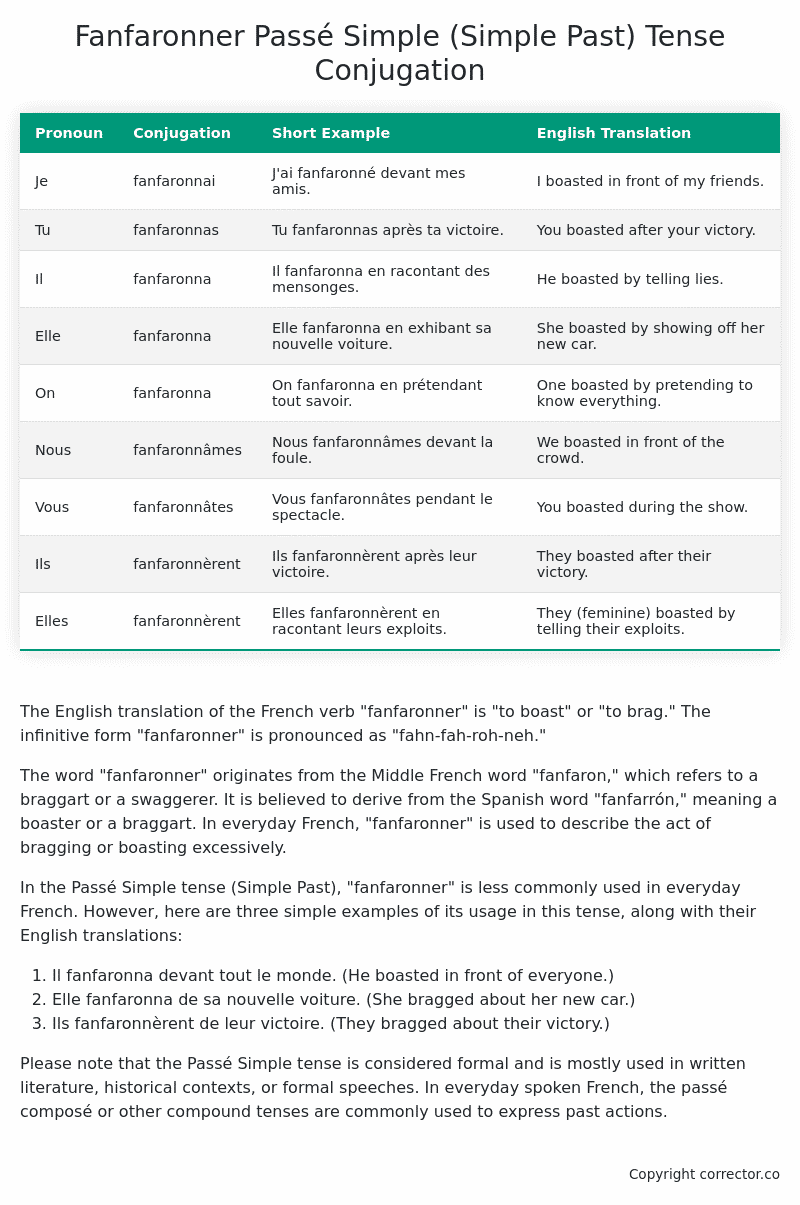Passé Simple (Simple Past) Tense Conjugation of the French Verb fanfaronner
Introduction to the verb fanfaronner
The English translation of the French verb “fanfaronner” is “to boast” or “to brag.” The infinitive form “fanfaronner” is pronounced as “fahn-fah-roh-neh.”
The word “fanfaronner” originates from the Middle French word “fanfaron,” which refers to a braggart or a swaggerer. It is believed to derive from the Spanish word “fanfarrón,” meaning a boaster or a braggart. In everyday French, “fanfaronner” is used to describe the act of bragging or boasting excessively.
In the Passé Simple tense (Simple Past), “fanfaronner” is less commonly used in everyday French. However, here are three simple examples of its usage in this tense, along with their English translations:
- Il fanfaronna devant tout le monde. (He boasted in front of everyone.)
- Elle fanfaronna de sa nouvelle voiture. (She bragged about her new car.)
- Ils fanfaronnèrent de leur victoire. (They bragged about their victory.)
Please note that the Passé Simple tense is considered formal and is mostly used in written literature, historical contexts, or formal speeches. In everyday spoken French, the passé composé or other compound tenses are commonly used to express past actions.
Table of the Passé Simple (Simple Past) Tense Conjugation of fanfaronner
| Pronoun | Conjugation | Short Example | English Translation |
|---|---|---|---|
| Je | fanfaronnai | J’ai fanfaronné devant mes amis. | I boasted in front of my friends. |
| Tu | fanfaronnas | Tu fanfaronnas après ta victoire. | You boasted after your victory. |
| Il | fanfaronna | Il fanfaronna en racontant des mensonges. | He boasted by telling lies. |
| Elle | fanfaronna | Elle fanfaronna en exhibant sa nouvelle voiture. | She boasted by showing off her new car. |
| On | fanfaronna | On fanfaronna en prétendant tout savoir. | One boasted by pretending to know everything. |
| Nous | fanfaronnâmes | Nous fanfaronnâmes devant la foule. | We boasted in front of the crowd. |
| Vous | fanfaronnâtes | Vous fanfaronnâtes pendant le spectacle. | You boasted during the show. |
| Ils | fanfaronnèrent | Ils fanfaronnèrent après leur victoire. | They boasted after their victory. |
| Elles | fanfaronnèrent | Elles fanfaronnèrent en racontant leurs exploits. | They (feminine) boasted by telling their exploits. |
Other Conjugations for Fanfaronner.
Le Present (Present Tense) Conjugation of the French Verb fanfaronner
Imparfait (Imperfect) Tense Conjugation of the French Verb fanfaronner
Passé Simple (Simple Past) Tense Conjugation of the French Verb fanfaronner (You’re reading it right now!)
Passé Composé (Present Perfect) Tense Conjugation of the French Verb fanfaronner
Futur Simple (Simple Future) Tense Conjugation of the French Verb fanfaronner
Futur Proche (Near Future) Tense Conjugation of the French Verb fanfaronner
Plus-que-parfait (Pluperfect) Tense Conjugation of the French Verb fanfaronner
Passé Antérieur (Past Anterior) Tense Conjugation of the French Verb fanfaronner
Futur Antérieur (Future Anterior) Tense Conjugation of the French Verb fanfaronner
Subjonctif Présent (Subjunctive Present) Tense Conjugation of the French Verb fanfaronner
Subjonctif Passé (Subjunctive Past) Tense Conjugation of the French Verb fanfaronner
Subjonctif Imparfait (Subjunctive Imperfect) Tense Conjugation of the French Verb fanfaronner
Conditionnel Présent (Conditional Present) Tense Conjugation of the French Verb fanfaronner
Conditionnel Passé (Conditional Past) Tense Conjugation of the French Verb fanfaronner
Conditionnel Passé II (Conditional Past II) Tense Conjugation of the French Verb fanfaronner
L’impératif Présent (Imperative Present) Tense Conjugation of the French Verb fanfaronner
L’impératif Passé (Imperative Past) Tense Conjugation of the French Verb fanfaronner
L’infinitif Présent (Infinitive Present) Tense Conjugation of the French Verb fanfaronner
L’infinitif Passé (Infinitive Past) Tense Conjugation of the French Verb fanfaronner
Le Participe Présent (Present Participle) Tense Conjugation of the French Verb fanfaronner
Le Participe Passé (Past Participle) Tense Conjugation of the French Verb fanfaronner
Struggling with French verbs or the language in general? Why not use our free French Grammar Checker – no registration required!
Get a FREE Download Study Sheet of this Conjugation 🔥
Simply right click the image below, click “save image” and get your free reference for the fanfaronner Passé Simple tense conjugation!

Fanfaronner – About the French Passé Simple (Simple Past) Tense
Formation
Usage
Narration
Historical Context
Interactions with other tenses
Passé Composé
Imparfait
Conditional and Subjunctive
Summary
I hope you enjoyed this article on the verb fanfaronner. Still in a learning mood? Check out another TOTALLY random French verb conjugation!


